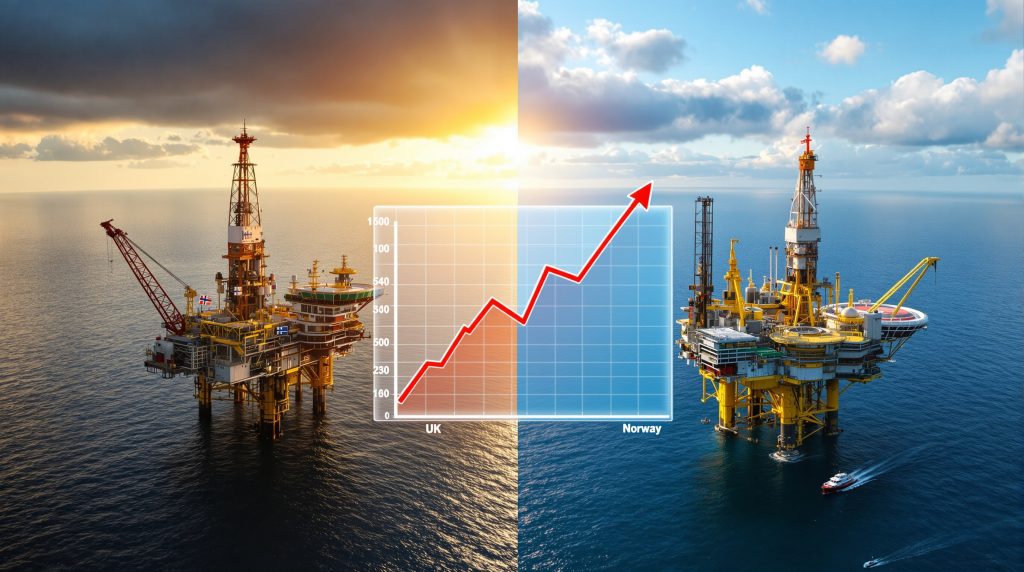How Are North Sea Investment Strategies Evolving in 2025?
The North Sea oil and gas landscape has undergone a remarkable transformation in recent years, with neighboring jurisdictions taking markedly different approaches to resource management. While sharing the same geological basin, the UK and Norway have implemented contrasting policies that have yielded starkly different investment outcomes. The UK has seen investment decline by approximately 40% over the past five years, while Norway continues to attract substantial capital with exploration investments reaching record levels.
Tax regimes have become the primary differentiator between these two jurisdictions. While field life extension projects now dominate UK investment portfolios, new field developments are increasingly concentrated in Norwegian waters. This divergence is reshaping the economic landscape of the entire North Sea region and has significant tariff policy implications for global energy markets.
Current Investment Climate in the North Sea
The investment climate in the North Sea reveals a tale of two distinctly different approaches. According to Offshore Energies UK (OEUK), UK North Sea production has declined 40% over the past five years, with projections indicating it could halve again by 2030. This decline isn't merely about geology—it reflects a fundamental shift in investment confidence.
Meanwhile, Norway has bolstered its position as Europe's largest gas supplier, stepping in to replace Russian volumes following geopolitical tensions. The Norwegian continental shelf continues to attract exploration capital, with the country planning its 26th licensing round for frontier areas under Energy Minister Terje Aasland's direction.
Perhaps most telling is that 2025 is set to become the first year since 1960 without a single exploration well in the UK North Sea, according to analysis from Wood Mackenzie. This unprecedented halt in exploration activity marks a historical turning point for a basin that has been a cornerstone of British energy security for generations.
What's Driving Norway's Continued Oil Investment Success?
Fiscal Stability and Investor Confidence
Norway's approach to oil and gas taxation has remained remarkably consistent since the 1990s, creating an environment where companies can make long-term investment decisions with confidence. While Norwegian tax rates are high, the predictability of the fiscal regime has proven more valuable to investors than lower rates with frequent changes.
This stability is no accident. As Tom Erik Kristiansen, energy specialist at Nordic-focused investment bank Pareto, noted: "In Norway, you have two or three of the biggest parties agreeing not to touch the oil and gas industry. In the UK it is much more party political." This cross-party consensus has created a foundation of investor confidence that transcends election cycles.
Exploration Incentives That Work
Norway offers substantial incentives for continued exploration, making it an attractive jurisdiction despite high headline tax rates. These incentives include:
- A 71.8% refund of exploration-related losses, significantly reducing risk for companies
- Consistent annual licensing rounds that provide predictable access to acreage
- Strong government support for frontier exploration in less-developed areas
- Clear pathway from discovery to development with streamlined approvals
- Regulatory processes designed to encourage rather than hinder development
This comprehensive approach to exploration incentives has kept the industry vibrant even as mature fields naturally decline, supporting robust investment strategy components for energy companies.
Strategic National Vision
Norway has maintained a clear strategic vision for its petroleum sector that transcends political cycles. Despite also targeting net-zero emissions, Norway has positioned its oil and gas industry as:
- Essential for European energy security
- A source of funding for the energy transition
- A creator of high-skilled domestic jobs
- A contributor to the Government Pension Fund Global, which has surpassed $2 trillion in value
Norwegian Energy Minister Terje Aasland articulated this vision clearly in August 2025, stating: "Norway wants to be a long-term supplier of oil and gas to Europe, while the Norwegian continental shelf will continue to create value and jobs for our country." He further emphasized that "We need new discoveries to ensure that Norway can remain a stable and predictable supplier of oil and gas to Europe."
Why Is UK North Sea Investment Declining So Dramatically?
Tax Regime Instability
The UK's approach to North Sea taxation has created significant uncertainty for investors, making long-term planning nearly impossible. This instability includes:
- The Energy Profits Levy (windfall tax) introduced in 2022 and subsequently increased
- Removal of the 29% investment allowance in late 2024, eliminating a key incentive
- Tax rates changing annually since 2022, creating a moving target for financial planning
- Lack of clarity on future fiscal framework, preventing confident investment decisions
Unlike Norway's consistent approach, the UK has created what Ineos Energy chairman Brian Gilvary described as "the most unstable fiscal regime in the world." As a former chief financial officer at BP, Gilvary's assessment carries significant weight in industry circles.
Regulatory Uncertainty and Political Risk
Beyond taxation, broader regulatory uncertainty has hampered investment in UK waters:
- Shifting policies between Conservative and Labour governments
- Unclear licensing future with ongoing consultations
- Contradictory signals on the role of oil and gas in energy transition
- Permitting delays and increasing compliance costs
This regulatory uncertainty has made companies hesitant to commit capital, especially when Norway offers a more predictable alternative in the same geological basin.
Industry Exodus: Case Studies
The unstable investment climate has triggered a significant exodus from the UK North Sea, with major players voting with their feet:
- Apache Corporation announced cessation of UK production by 2030, citing regulatory uncertainty. The company stated that "the expected returns do not economically support making investments required under the combined impact of the regulations."
- Ineos Energy ended all UK investment in summer 2025, with chairman Brian Gilvary stating that "The UK's current tax regime, its over-regulation and the negative political attitude towards oil and gas are barriers that would deter any investor at the moment."
- Multiple smaller operators have divested assets to focus on more predictable jurisdictions
- Service sector companies have relocated operations to Norway and other markets with more stable outlooks
This exodus represents not just a loss of investment but a drain of expertise and capabilities that may be difficult to rebuild.
What Are the Key Metrics Showing the Investment Divergence?
Exploration Activity Comparison
The contrast in exploration activity between the two countries reveals the impact of different policy approaches:
| Metric | UK | Norway |
|---|---|---|
| Exploration wells (2025) | 0 | 32 |
| New licenses awarded (2024) | 0 | 53 |
| Discoveries (2020-2025) | 4 | 27 |
| Average discovery size | 15 million boe | 45 million boe |
The numbers tell a stark story. While Norway continues robust exploration activities, the UK faces an unprecedented exploration drought. The last time the UK North Sea had zero exploration wells was 1960, before the basin's hydrocarbon potential was fully recognized.
Production Trajectories
Production trajectories further highlight the divergence between the two jurisdictions:
- UK production declined 40% in the past five years, projected to halve again by 2030
- Norwegian production has increased by approximately 15% since 2020, with a stable outlook until the early 2030s
- UK gas import dependency has increased from 50% to 70% since 2020
- Norway has become Europe's largest gas supplier, replacing Russian volumes and strengthening its geopolitical position
These production trends have significant implications for energy security, trade balances, and economic development in both countries, with potential oil price rally impacts affecting investment decisions.
How Are Companies Adapting Their Investment Strategies?
Portfolio Rebalancing
Companies operating in both jurisdictions are increasingly rebalancing their portfolios in response to the different investment climates:
- Shifting capital expenditure from UK to Norwegian assets
- Prioritizing Norwegian exploration over UK field extensions
- Focusing UK investments on late-life asset optimization and cost reduction
- Accelerating decommissioning timelines for UK assets
This rebalancing represents a rational response to the different risk-reward profiles in each jurisdiction. Companies with exposure to both sides of the North Sea have a clear incentive to allocate capital where returns are more predictable.
Technology Investment Shifts
Investment in technology shows different priorities on either side of the North Sea:
- UK focus on cost reduction and efficiency improvements to maximize returns from existing assets
- Norwegian emphasis on exploration technology and recovery enhancement to develop new resources
- Digital transformation projects more prevalent in Norwegian operations, with greater confidence in long-term returns
- Decarbonization investments concentrated in Norwegian assets despite higher baseline emissions, reflecting greater confidence in long-term viability
These technology investment patterns reflect different time horizons, with Norwegian operations attracting investments with longer payback periods due to greater fiscal certainty.
What Are the Economic Consequences of Different Investment Approaches?
Employment and Supply Chain Impacts
The divergent investment trends have significant consequences for employment and supply chains:
- UK offshore workforce has declined by approximately 35% since 2019
- Norwegian offshore sector has added approximately 7,000 jobs in the same period
- UK supply chain companies increasingly dependent on international markets to compensate for domestic decline
- Norwegian service sector strengthened by domestic activity and innovation
These employment shifts represent not just jobs but specialized skills and expertise that, once lost, may be difficult to rebuild if policy conditions change.
Government Revenue Comparison
Government revenues show stark differences in fiscal outcomes:
- Norwegian oil fund has surpassed $2 trillion in value, holding on average 1.5% of all listed companies in the world
- UK tax receipts from North Sea have declined by approximately 60% since 2019, despite higher tax rates
- Norway is investing petroleum revenues in renewable energy development and infrastructure
- UK facing declining returns despite higher tax rates, illustrating the counterproductive nature of unstable fiscal policy
This revenue divergence demonstrates that policy stability often generates more government income than higher but unpredictable tax rates.
What Does the Future Hold for North Sea Investment?
UK Outlook: Potential Recovery Pathways
The UK's North Sea investment future depends largely on policy decisions expected in late 2025:
- Consultation on replacement for Energy Profits Levy concluding, with industry hoping for more stable framework
- Potential return to a more predictable fiscal regime that encourages long-term investment
- Licensing review outcomes could reopen exploration and development opportunities
- Industry calling for predictable access to new resources to prevent premature decommissioning
OEUK urges the government to "replace the Energy Profits Levy with a permanent profits-based tax system and update licensing rules to provide predictable access to new resources, ensuring infrastructure is fully utilized rather than decommissioned prematurely."
Norway's Forward Strategy
Norway continues to plan for long-term petroleum sector development:
- 26th licensing round announced for frontier areas to stimulate new exploration
- Continued support for exploration in mature areas to maximize recovery
- Infrastructure investments to extend field life and connect new developments
- Integration of petroleum operations with offshore wind and carbon capture and storage projects
Energy Minister Terje Aasland has emphasized that Norway "needs new discoveries to ensure that Norway can remain a stable and predictable supplier of oil and gas to Europe."
Investment Opportunities Despite Challenges
Despite the challenges, investment opportunities remain in both sectors:
- Late-life asset acquisitions in UK waters at attractive valuations for specialized operators
- Infrastructure-led exploration near existing Norwegian developments with lower cost profiles
- Carbon capture and storage projects in depleted fields, particularly in UK waters
- Platform electrification projects to reduce emissions, especially in Norwegian operations
Investors with different risk profiles and time horizons can still find opportunities across the North Sea, though the nature of these opportunities differs significantly between jurisdictions.
How Are ESG Considerations Affecting Investment Decisions?
Decarbonization Investments
Both countries are seeing increased investment in emissions reduction, though with different approaches:
- Platform electrification projects accelerating in Norwegian waters, with major developments like Johan Sverdrup field leading the way
- Methane leak detection and prevention technologies becoming standard across operations
- Integration of offshore wind with oil and gas operations to reduce carbon footprint
- Carbon capture and storage developments at mature fields, creating new life for aging infrastructure
These investments reflect the industry's recognition that environmental performance and energy transition strategies are essential for maintaining social license to operate.
Stakeholder Expectations
Investor and stakeholder expectations are evolving rapidly:
- Increasing pressure for transparent emissions reporting and reduction targets
- Capital availability increasingly linked to credible transition plans
- Community engagement becoming more important for project approval
- Workforce transition planning now essential for investment cases
Notably, Norway has managed to balance strong environmental credentials with continued petroleum development, demonstrating that the two are not mutually exclusive with proper governance.
What Lessons Can Be Learned From the North Sea Investment Contrast?
Policy Stability vs. Flexibility
The North Sea experience demonstrates that policy stability often trumps tax rates in investment decisions:
- Long-term fiscal certainty enables project planning and attracts patient capital
- Frequent changes, even if well-intentioned, deter investment and reduce government revenue
- Cross-party consensus creates investor confidence that transcends electoral cycles
- Clear delineation between climate goals and fiscal policy proves more effective than mixing the two
These lessons have relevance far beyond the North Sea, applying to resource development worldwide and influencing trade war dynamics between major economic powers.
Balancing Energy Security and Transition
The contrasting approaches highlight different ways to balance energy security with transition goals:
- Norway demonstrates how continued petroleum development can coexist with climate ambitions
- UK approach risks increasing import dependency without necessarily accelerating transition
- Revenue from oil and gas can fund transition when properly managed through sovereign wealth mechanisms
- Domestic production typically has lower emissions intensity than imports, creating a potential environmental paradox
These balancing acts will become increasingly important as countries worldwide navigate the energy transition.
FAQ: North Sea Oil Investment
Will the UK reverse its approach to North Sea investment?
The UK government is currently reviewing its approach through consultations on the tax regime and licensing. Industry stakeholders are advocating for a more stable fiscal environment and predictable access to resources. Decisions expected in late 2025 will determine whether the UK changes course to stem the decline in domestic production.
How long can Norway sustain its current production levels?
Without new discoveries, Norwegian production would naturally decline from the early 2030s. However, continued exploration success could maintain production levels well into the 2040s, according to the Norwegian Petroleum Directorate. This timeline provides a multi-decade horizon for managed transition.
Are ESG concerns limiting investment in either country?
While ESG considerations are increasingly important, they haven't significantly limited investment in Norway due to the country's focus on low-emission production methods and clear national strategy. In the UK, policy uncertainty rather than ESG concerns has been the primary investment barrier, though both factors interact.
What role does technology play in North Sea investment decisions?
Technology is crucial for extending field life and reducing costs in mature basins like the North Sea. Norway's consistent support for technology development has helped maintain its attractiveness to investors, while the UK has seen less innovation investment due to fiscal uncertainty. Electrification, digitalization, and enhanced recovery technologies are particularly important.
How are service companies responding to the investment divergence?
Service companies are increasingly prioritizing Norwegian operations while maintaining minimal presence in the UK. This shift has led to capability gaps in the UK supply chain and concentration of expertise in Norway, further reinforcing the investment divergence. Once lost, these specialized capabilities are difficult to rebuild.
Want to Stay Ahead of Major ASX Mining Discoveries?
Discovery Alert's proprietary Discovery IQ model delivers real-time notifications when significant mineral discoveries are announced on the ASX, helping investors identify opportunities before the broader market. Explore how historic discoveries have generated substantial returns by visiting our dedicated discoveries page and gain your market-leading advantage today.




